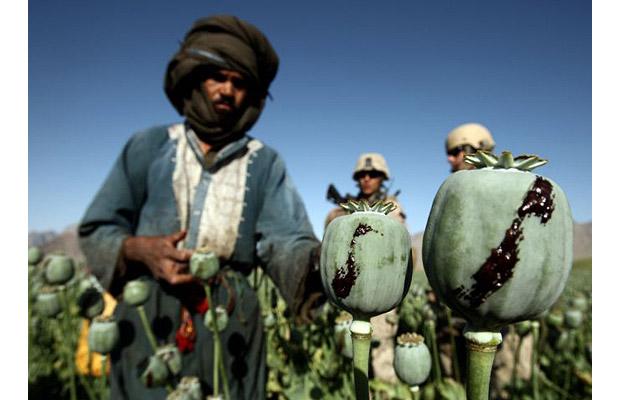The American-led war on terror has led to the rampant increase in opium production in Afghanistan. According to the United Nations Office on Drugs and Crime (UNODC), Afghanistan’s poppy cultivation has increased for the third year in a row. The country holds a near-monopoly as it is responsible for producing over 90% of the world’s opium, which is the raw ingredient of heroin. The highly decentralized business can generate over USD $2.4 billion each year, which contributes to approximately 15% of the country’s GDP. Afghanistan’s economy depends on the illicit drug trade, which has been fuelled by violence, insecurity, poverty, and a lack of government authority. The country is caught in a loop where the cultivation of opium is widespread in areas where there is the most insecurity, and that insecurity is being sustained by its opium production.
The Benefits of Opium
The UNODC refers to opium as one of the world’s deadliest drugs due to its highly addictive properties. Consequently, the worldwide use of narcotics has led to an ever-growing demand for illegal opium. It is estimated that Afghanistan produces 30% more of the drug than the global demand. Expressed quantitatively, Afghanistan yields approximately 375 tons of heroin and 3,700 tons of opium per year.
The World Bank (WB) has noted that the financial benefits to individuals along the various levels of the opium supply chain have proven to be highly desirable. Despite the uneven distribution of profits, Afghan farmers are opting to harvest poppies since they can grow for years with little water or maintenance, which is an advantage in a state that has been experiencing economic instability and severe drought. The production and distribution of opium has demonstrated to be a ready source of cash for poverty stricken farmers, traffickers, and insurgent groups alike.
[captionpix align=”right” theme=”elegant” width=”264″ imgsrc=”http://natoassociation.ca/wp-content/uploads/2013/07/opium2.jpg” captiontext=””]
A Devil’s Bargain
Until 2001, the Taliban used draconian methods to prohibit the cultivation and production of opium in Afghanistan. This was achieved by destroying poppy fields, physically beating farmers until they agreed to stop harvesting the crop, and occasionally executing non-compliant parties. When the regime collapsed in mid-December 2001, the opium market picked up from where it left off in 1996. In tandem with the beginning of the War on Terror came the war on illegal opium trade. The trend appears to be that opium production increased the most in areas where there have been higher levels of insecurity; namely regions where foreign military intervention forces have remained.
When domestic and international counter-narcotic efforts began to be carried out in Afghanistan, poppy farmers turned to Taliban insurgents for support. In exchange for the protection of the farmers’ livelihood, proceeds from the opium production would go towards the purchase of weapons and other necessary items to support the insurgency.
A UNODC report stated that the Taliban insurgents receive approximately 10% of the value of opiates being transported by traffickers. It is estimated that the insurgency receives USD $70 million from taxes and transport alone, but the full scope of the Taliban insurgency’s role is unclear.
Nearly 11 years after the fall of the Taliban regime, some can argue that the insurgency is no longer concerned with ideology or religion. Instead, the group is exploiting the state’s insecurity to accumulate wealth under the pretense of a broader political operation. The criminalization of the state continues to encourage Afghanistan’s opium production to preserve the country’s current circumstances.
Attempting to Break the Cycle
According to the UNODC’s 2013 Risk Assessment, there is a strong association between insecurity and the lack of agricultural assistance that is fuelling the continued existence of the opium production.
The illicit drug trade is funding the Taliban’s insurgency, which is the chief cause for Afghanistan’s virtually nonexistent security. As reported by Ján Kubiš, UN Secretary-General’s Representative for Afghanistan, the production and distribution of opium is simultaneously funding insurgent activity. If it is not curtailed, it will continue to undermine the state’s insecurity and economic self-sufficiency. The possibility of this progression continuing is a reason for concern in Afghanistan. When foreign military forces withdraw in 2014, the country’s economy could heavily rely on the illicit drug trade with the possibility of becoming a narcostate, despite international aid projects to suppress drug trafficking.
Recently, the UNODC has announced the accreditation of training programs for the Counter Narcotics Police of Afghanistan (CNPA) and its Mobile Training Team (MTT) in a bid to support counternarcotics campaigns. Even though the MTT is receiving funding from the Governments of Japan and Canada, it still requires more support to help the country break free from the cycle of instability. The dilemma is that the state’s instability is feeding the opium production, and vice versa. The country has, historically, been well-known for harvesting pomegranates, nuts, grapes, and melons. If Afghan farmers can receive the necessary agricultural assistance to grow these products, it can slowly encourage them to deviate from poppy cultivation; thus, gradually gaining and increasing state security while decreasing illicit drug trafficking. Afghanistan is left facing an overwhelmingly complex and multi-faceted problem that will require a great deal of support from international bodies and governments to help rebuild the state’s economy and security.




